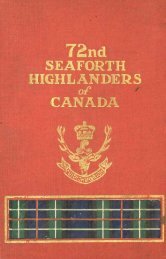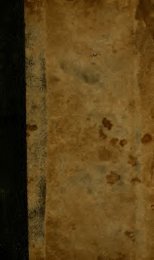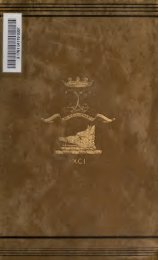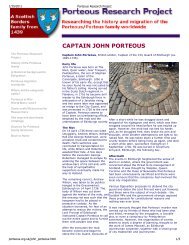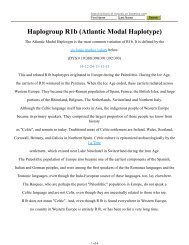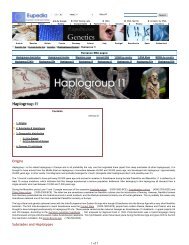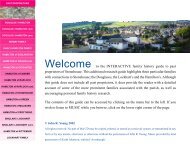Wedderburn book; a history of the Wedderburns in ... - waughfamily.ca
Wedderburn book; a history of the Wedderburns in ... - waughfamily.ca
Wedderburn book; a history of the Wedderburns in ... - waughfamily.ca
You also want an ePaper? Increase the reach of your titles
YUMPU automatically turns print PDFs into web optimized ePapers that Google loves.
xlviii. THE WEDDERBUllN BOOK.<br />
The third son <strong>of</strong> old Robert <strong>Wedderburn</strong> and Janet Kyd was Robert,<br />
who was for mnny years an active notary <strong>in</strong> Dundee. He<br />
Robert "Wedder- was born <strong>in</strong> 154G, and was admitted a notary <strong>in</strong> 1.57-i after<br />
iwS^fei^'^' ten years' study with Alexander Guthrie <strong>in</strong> Ed<strong>in</strong>bur;,'b,<br />
and seven with his own bro<strong>the</strong>r Alexander, <strong>the</strong>n clerk <strong>of</strong><br />
Dundee. Soon after his admission he had to br<strong>in</strong>g an action and get a<br />
decree aga<strong>in</strong>st one JIa<strong>the</strong>w, for "mispreson<strong>in</strong>g and blasphem<strong>in</strong>g him," by<br />
" allegeand and sayand that he had maid and gev<strong>in</strong>e ai.e iustrunient to Robert<br />
Rollok quhilk was fals "<br />
; no doubt an important slander, as <strong>the</strong> notaries were<br />
very jealous <strong>of</strong> <strong>the</strong>ir own and <strong>the</strong>ir predecessors' reputation. A century<br />
later, <strong>in</strong> 1U77, James <strong>Wedderburn</strong>, <strong>the</strong>n clerk <strong>of</strong> Dundee, summoned Thomas<br />
Anderson for hav<strong>in</strong>g used " rase base and opprobrious speeches aga<strong>in</strong>st hiua<br />
and his predecessors, say<strong>in</strong>g that <strong>the</strong>y had made false <strong>in</strong>struments without<br />
ground or warrant, so tak<strong>in</strong>g away <strong>the</strong>ir good name," ami Anderson was<br />
ordered to pay a f<strong>in</strong>e, " sit down on his knees <strong>in</strong> court," and promise to never<br />
60 <strong>of</strong>fend aga<strong>in</strong>. Robert was admitted a burgess <strong>of</strong> Dundee <strong>in</strong> 15SS, and <strong>in</strong><br />
<strong>the</strong> next year was elected procurator fis<strong>ca</strong>l and master <strong>of</strong> work tor <strong>the</strong><br />
build<strong>in</strong>g <strong>of</strong> <strong>the</strong> new school <strong>of</strong> <strong>the</strong> burgh. His life was evidently spent <strong>in</strong><br />
and about Dundee, where he died <strong>in</strong> Oct. 1611, his heir be<strong>in</strong>g Peter, <strong>the</strong><br />
son <strong>of</strong> his immediate elder bro<strong>the</strong>r. He had married <strong>in</strong> 1583 Margaret<br />
Myln, and by her, who died before him, had issue four sons and two<br />
daughters, viz., Robert, James, Robert, and Alexander, Janet, and Elizabeth.<br />
The births <strong>of</strong> <strong>the</strong> tlrst three sons are recorded by him <strong>in</strong> one <strong>of</strong> his m<strong>in</strong>ute<br />
<strong>book</strong>s (post, vol. ii., p. 207) with a note <strong>of</strong> <strong>the</strong> signs <strong>of</strong> tiie zodiac under<br />
which <strong>the</strong>y were born. The fourth son, Alexander, lived till 1G07-9, and his<br />
name sometimes occurs as witness<strong>in</strong>g documents 1605-7, but, like his bro<strong>the</strong>rs<br />
and sisters, he died unmarried <strong>in</strong> his fa<strong>the</strong>r's life.'<br />
As a notary Robert's acti\ity is best witnessed by six large protocol<br />
<strong>book</strong>s and twelve small m<strong>in</strong>ute <strong>book</strong>s <strong>in</strong> his hand, all <strong>of</strong> which are still<br />
preserved <strong>in</strong> <strong>the</strong> charter room <strong>of</strong> <strong>the</strong> Dundee Town Ho\ise. From <strong>the</strong>se we<br />
get some <strong>in</strong>sight <strong>in</strong>to <strong>the</strong> extent ot his edu<strong>ca</strong>tion. Follow<strong>in</strong>g what seems to<br />
have been a fa?hiou <strong>of</strong> <strong>the</strong> time, for <strong>the</strong> same is <strong>the</strong> <strong>ca</strong>se<br />
Notarial with o<strong>the</strong>r such <strong>book</strong>s, he used <strong>the</strong> first two or three pages <strong>of</strong><br />
Boo^°^ each <strong>of</strong> his protocul <strong>book</strong>s as a sort <strong>of</strong> commonplace <strong>book</strong>.<br />
Quotations from classi<strong>ca</strong>l writers, from Ovid (a copy <strong>of</strong> whose<br />
"Metamorphoses," <strong>in</strong> "very braw b<strong>in</strong>d<strong>in</strong>g," passed from him to his nephew,<br />
Davidj, from Cicero, Plutarch, Lu<strong>ca</strong>n, Claudian, and <strong>the</strong> Vulgate ;<br />
qua<strong>in</strong>t<br />
proverbs, mottoes, and rhymes <strong>of</strong> various sorts are freely used. Inside <strong>the</strong> cover<br />
<strong>of</strong> his first <strong>book</strong> he writes, for example, " Temperantia prorogat annos," " Dies<br />
diem docet," " Nocte dieque leges si vis addiscere leges," " patior ut potiar,"<br />
and a quotation from Lu<strong>ca</strong>n. The fecond <strong>book</strong> opens with more Lat<strong>in</strong><br />
mottoes, such as "Quod fors fert ferendum est," " Bonum est: habere bonum<br />
Domen,"' and quotations from Claudian, Cicero, Plato (<strong>in</strong> Lat<strong>in</strong>), etc., toge<strong>the</strong>r<br />
with an English passage describ<strong>in</strong>g envy as " ane certane tre quha rute is<br />
malice and illwill . . . quhais tlowris is mock<strong>in</strong>g and divysioun," etc., while at<br />
<strong>the</strong> end <strong>of</strong> <strong>the</strong> volume is a list <strong>of</strong> <strong>the</strong> " maist peralus and dangerous dayis <strong>in</strong><br />
<strong>the</strong> yeir," days on which no one should wed a wife, start on a journey, be seized<br />
with illness, or beg<strong>in</strong> any great piece <strong>of</strong> work—which shows that Robert's<br />
scholarship did not prevent his superstition. I need not cont<strong>in</strong>ue to enumerate<br />
<strong>the</strong> different quotations <strong>in</strong> <strong>the</strong>se <strong>book</strong>s, a more detailed account <strong>of</strong> each <strong>of</strong><br />
which will be found <strong>in</strong> <strong>the</strong> second volume <strong>of</strong> this work. t..ge<strong>the</strong>r with extracts<br />
from <strong>the</strong> protocols which <strong>the</strong>y conta<strong>in</strong>^ {Dimdee Protocol Books, pp. iOG scqq.,<br />
These claldren may all have died <strong>in</strong> <strong>the</strong> plague, which was importc.1 to D.n I« fr..ra Knncc ia<br />
1605, and ^J stUl rag<strong>in</strong>g <strong>in</strong> 160S. Ko leas than four thou^ud j.-r^-u. .1.^1 dunug ihi.<br />
Sir *^"mamW^rderbl"ha^- decorated <strong>the</strong> cornice <strong>of</strong> a d<strong>in</strong><strong>in</strong>g-r^m recent., bu.lt .t Mcr^I.th


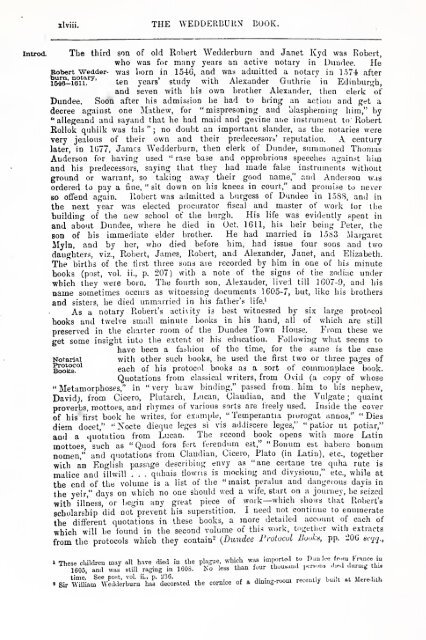
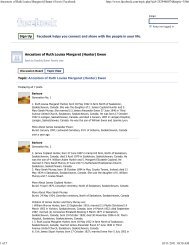
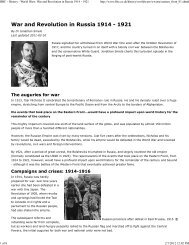
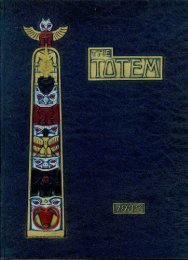
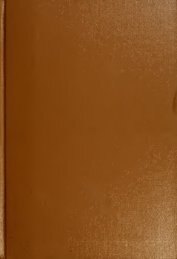
![SS Sir Francis [+1917] - waughfamily.ca](https://img.yumpu.com/49438251/1/190x245/ss-sir-francis-1917-waughfamilyca.jpg?quality=85)
